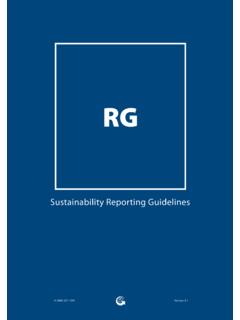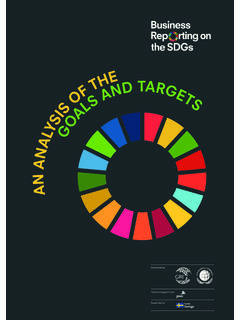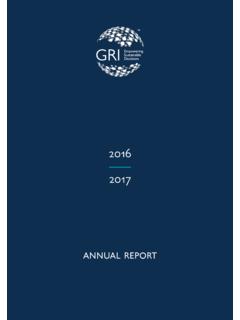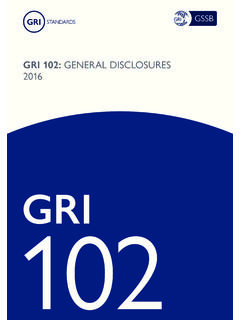Transcription of The GRI Standards - Global Reporting Initiative
1 With support from:The GRI StandardsA guide FOR POLICY MAKERSThe importance of transparency and accountabilityThe Global sustainability Reporting landscapeThe reliability of sustainability reportsPublic sector Reporting and accountabilityHow does GRI support policy makers?Promoting transparency through public policyThe GRI StandardsThe Global Reporting Initiative (GRI)Table of contents123456782 The importance of transparency and accountabilityTransparency on the sustainability impacts of a business is essential for continuous improvement as well as for stakeholder relationships. Without transparency, there is no trust and without trust it is very complex to do business, markets do not function efficiently, and institutions lose their legitimacy.
2 corporate accountability is such an important factor in the efforts to achieve the Sustainable Development Goals (SDGs) that it has been included as one of the 169 goals. Goal states that the United Nations member states should encourage businesses, especially large corporations, to adopt sustainable practices and integrate sustainability information into their Reporting cycle. This target aims for the private sector s contribution to sustainable development to be accounted for with the same frequency, thoroughness, and importance as an organization s financial performance. sustainability Reporting began in the 1990s and is relatively recent compared to the mandatory financial Reporting that has been in place since the Great Depression.
3 However, Reporting on sustainability information is increasingly becoming a legal requirement and less of a voluntary practice. Governments, stock exchanges, market regulators, investors, civil society and other stakeholders are demanding more and better information on organizations sustainability impacts. In a rapidly changing environment, corporate accountability becomes imperative. That is why it is important that measuring and Reporting are done according to internationally recognized Standards such as the GRI sustainability Reporting Standards (GRI Standards ). This ensures data quality and comparability, and contributes to better decision making by allowing access to information that promotes better decisions.
4 Companies are increasingly being called on to show that they operate and make decisions in a responsible sustainability Reporting there are different types of actors and initiatives that guide organizations. Each one has a different nature and a specific role in the corporate sustainability landscape. Organizations can use the GRI Standards in combination with other Reporting frameworks, including the International Integrated Reporting Framework, the CDP climate change and water questionnaires, and the SASB industry Standards . GRI continually works together with other Reporting frameworks to avoid duplication of disclosure information is defined, standardized, reported, issued, and used through different links:The Global sustainability Reporting landscape2 REPORTISSUERSSTANDARDS AND FRAMEWORKSDATA AGGREGATORSANALYSTSANDRATINGS1234 DATA CONSUMERS54 sustainability ManagementPractices for a more responsible and sustainable operationManagementprinciplesReporting guideManagementstandardsReporting frameworkManagementacknowledgementsRepor ting standardA set of guidelines, directives, or rules governing the management of an organization.
5 They refer to what is expected in terms of sustainable management. Guidelines, directives or good practices to define how an organizationprepares a or Standards for preparing the report, to ensure the information disclosed and presented is high quality, reliable and determine the datato report and are composed of aset of specific and detailed requirements about the type of information to be disclosed, ensuring it is comparable, accurate and , measurable andverifiable requirements forelements of an organization s sustainability , awards and distinctions that recognize an organization's implementation of good management ReportingMeasurement and information disclosure practices for sustainable managementCORPORATE sustainability INSTRUMENTS5 The Global Reporting Initiative (GRI)GRI is the independent, international organization that helps businesses and other organizations take responsibility for their impacts, by providing them with the Global common language to communicate those impacts.
6 It provides the world s most widely used Standards for sustainability Reporting the GRI Standards , which are available as a free public good. Since 1997, the GRI Standards have been continuously developed to represent the world s best practice for Reporting on economic, environmental, and social impacts. In addition to developing the GRI Standards , GRI also supports their use and implementation among different types of business actors, civil society, and policy is a non-profit organization, backed by a wide range of partners who support the organization s work around the world to advance sustainable development through greater transparency and has a Global presence through Regional Hubs in Johannesburg (Africa), Singapore (ASEAN), S o Paulo (Brazil), Hong Kong (Greater China Region), Bogota (Hispanic America), New York (North America), and New Delhi (South Asia).
7 All other regions (including Europe) are supported from GRI s Global Secretariat in Amsterdam (The Netherlands).3 GRI is a non-profit organization, backed by a wide range of partners who support the organization s work around the world to advance sustainable development through greater transparency and more information on GRI, visit the website of the world s 250 largest companies prepare their sustainability reports using the GRI Standards *The GRI StandardsBy better understanding, managing and disclosing their impacts, companies can enhance strategic decision-making, reduce risks, identify business opportunities and strengthen stakeholder GRI Standards help organizations increase their transparency and communicate both their positive and negative impacts on sustainable development.
8 The GRI Standards enable consistent and high quality sustainability Reporting , which helps organizations meet the needs of their stakeholders for comparable and reliable data. They are the most widely used Standards in the world and are explicitly referenced in 168 Reporting requirements in 67 GRI Standards are a free public good. Any organization, large or small, private or public, regardless of sector, location, and Reporting experience, can use the GRI Standards to report on its impacts in a standardized and comparable way. Each organization reports on topics that reflect the organization s significant economic, environmental, and social impacts and that are important to its stakeholders. With the GRI Standards , these are the material topics that the organization reports on.
9 An organization s material topics are determined based on the organization s activities and business relationships. Data privacy, for instance, might be material for a telecommunications company to report on, while child labor might be material for a garment company with extensive supply chains. The GRI Standards define a set of principles for organizations to define the content of their reports.* Source: The KPMG Survey of sustainability Reporting 2020 1 Carrots & Sticks Report (2020)Download the GRI Standards on GRI s website GRI Standards development processThe GRI Standards are issued by the Global sustainability Standards Board (GSSB), an independent operating entity of GRI. They are developed according to a formally defined due process overseen by the Due Process Oversight Committee (DPOC).
10 Experts from different stakeholder groups across the world are involved in developing the GRI Standards using a consensus-seeking approach that builds on their diverse backgrounds and expertise. The GSSB also routinely conducts public comment periods to gather stakeholder feedback on draft Standards . Transparency lies at the heart of the GSSB s work. All meetings of the GSSB and the documents discussed at these meetings, including drafts of Standards , are publicly accessible via the GRI website. The GSSB receives independent funding from GRI, sourced from grants, corporate programs, and revenues from GRI s support services. Additionally, launched in 2020, the Global Standards Fund (GSF) provides for the independent, multi-stakeholder development of the GRI Standards as a free public good available to all organizations and is an opportunity for foundations, governments, private sector organizations and individuals to participate in a coalition of likeminded funders who want to see companies integrate transparency and sustainability at the core of their of this helps ensure that the GRI Standards serve the public interest and can be applied by any organization of the GRI Standards with intergovernmental instrumentsThe GRI Standards are aligned with widely recognized international instruments for responsible business behavior.










